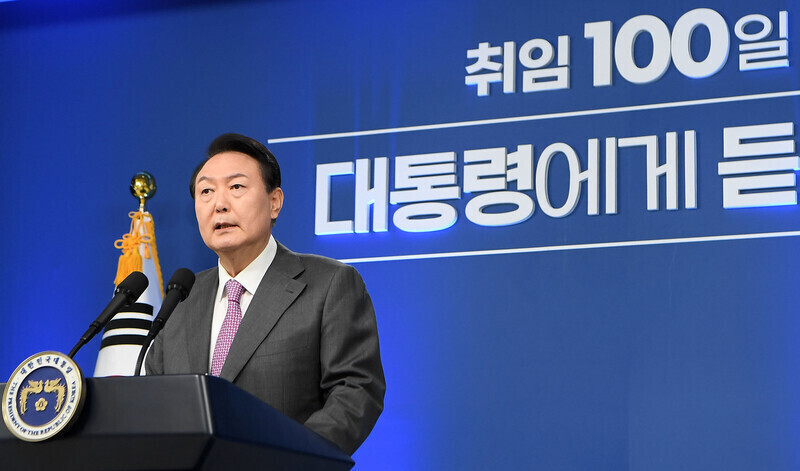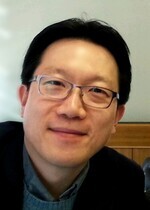hankyoreh
Links to other country sites 다른 나라 사이트 링크
[Guest essay] How should Korea break its vicious cycle of political crises?


Shin Jin-wook, professor of sociology at Chung-Ang University
Various assessments and suggestions for improvement have been made recently for the political crisis and confusion that the Yoon Suk-yeol administration has faced in its early stages.
Many are harboring heartfelt hopes that the new administration will heed the opinions and explore ways of carrying on the achievements of past administrations while surmounting its own limitations. The administration has to succeed in this way for the level of competing parties to rise along with it.
In addition to those sorts of short-term projects, another thing that we need to consider is the continued trend of political instability and turbulence that has erupted in South Korea with each new administration that has come to office since the 2000s.
People on all sides — progressives and conservatives, supporters of the Democratic Party or one of the conservative parties — are experiencing a kind of collective political bipolar disorder. From their perspective, there is a dramatic mood swing every few years between moments of joy and hopefulness and moments of anger and despair.
In 2002, Roh Moo-hyun was elected president against a backdrop of World Cup Red Devils supporters and enthusiastic Rohsamo (“people who love Roh Moo-hyun”) gatherings. Yet his popular support and his footing in the political world remained precarious, and by the later stages of his term, things began to spiral.
It was a situation that led to conservatives gaining control of administrative and legislative duties in both the central and local governments. But Roh’s successor as president, Lee Myung-bak, triggered huge public resistance almost as soon as he arrived in office, experiencing a grave political crisis where his support ratings plummeted below 20%.
He was followed by Park Geun-hye, who was elected by the largest share of the vote of any president since South Korea’s democratization. She had campaigned with an inclusive vision of “economic democracy and welfare,” but after facing accusations of using the National Intelligence Service, military and police as political tools and allowing unelected associates to control things behind the scenes, she was finally impeached.
Next came the Moon Jae-in administration, which billed itself as the “candlelight administration” ushered into office by the demonstrations against Park.
It enjoyed high support ratings and high hopes at first, but by the end of its term, it had alienated the public, handing the reins over to the conservatives again after five years. The latest administration has been in trouble right out of the gate.
It’s a natural state of affairs in a democracy for different parties to take turns in power. But there’s definitely something extreme about the dizzying rollercoaster of repeated swings in South Korean politics over the past two decades.
So the important thing right now isn’t just the question of what the Yoon administration needs to do to overcome its crisis. What’s more essential is solving the repeated problem that we keep running into no matter who is elected president or what party comes to power: the impossibility of governing. A few of the responses are worth examining here.
The first has to do with calls for changing the generational guard. There’s a certain political romanticism at play in our establishment politics, where we hang our hopes on unknown quantities in the belief that the answer does not lie in electing a different party to power.
We can understand this as a context where discontentment with the political reality and hopes for a different kind of politics become conceptualized as a “generational shift.” But this sort of approach can only take real shape where there is some next-generation group or leader that the public longs to see taking the place of the older generation in power.
The second involves calls for a multi-party system. South Korea obviously already has a multi-party political system, but with the two main parties holding such a strong grip, people holding this position are urging the adoption of a new system that encourages more competition among different parties.
There’s certainly a case to be made for constructive competition, given all the many problems with this back-and-forth political system where the two main parties take turns in power. But it’s not clear that the system is to blame for the smaller parties’ failure to gain traction, and there are also questions that arise as to what conditions are necessary for a better third party to grow.
A third response has been to call for amendment of the Constitution to institute a parliamentary system. It’s certainly true that the presidential system has caused severe problems, with so much of politics under the sway of a single person.
But without a foundation in place in terms of the political elite and political culture, we could see the same sorts of shortcomings in a parliamentary system that we have with the presidential system. Most of the countries considered to be politically advanced have a parliamentary system, but it isn’t the parliamentary system that makes them advanced. Eastern Europe is a case in point.
I sympathize with the attitudes behind the ideas listed above, but they still seem based in wishful thinking and ideas about how things “ought to be.” If we’re going to keep our feet on the solid ground of reality, whatever our alternative happens to be, we need to be able to suggest plausible avenues for improvement for the things that are being discussed as major issues in South Korean politics today.
That means that the real litmus test should be a pragmatic question: Will this alternative have the effect of solving current problems in South Korean politics?
Some of things mentioned as worrying aspects of our political reality today, or as causes behind those aspects, include political polarization among voters; populism and the identification of politics with particular people; the vertical alliance between politics and their political “fan base”; a lack of professional politicians with expertise and training; and hate-based politics and fake news online.
What do we have to do to bring about some kind of meaningful changes to these repeated political crises? The heart of any alternative approach is going to be found in the heart of that question.
Please direct questions or comments to [english@hani.co.kr]

Editorial・opinion
![[Editorial] Intensifying US-China rivalry means Seoul must address uncertainty with Beijing sooner than later [Editorial] Intensifying US-China rivalry means Seoul must address uncertainty with Beijing sooner than later](https://flexible.img.hani.co.kr/flexible/normal/500/300/imgdb/original/2024/0517/8117159322045222.jpg) [Editorial] Intensifying US-China rivalry means Seoul must address uncertainty with Beijing sooner than later
[Editorial] Intensifying US-China rivalry means Seoul must address uncertainty with Beijing sooner than later![[Column] When ‘fairness’ means hate and violence [Column] When ‘fairness’ means hate and violence](https://flexible.img.hani.co.kr/flexible/normal/500/300/imgdb/original/2024/0516/7417158465908824.jpg) [Column] When ‘fairness’ means hate and violence
[Column] When ‘fairness’ means hate and violence- [Editorial] Yoon must stop abusing authority to shield himself from investigation
- [Column] US troop withdrawal from Korea could be the Acheson Line all over
- [Column] How to win back readers who’ve turned to YouTube for news
- [Column] Welcome to the president’s pity party
- [Editorial] Korea must respond firmly to Japan’s attempt to usurp Line
- [Editorial] Transfers of prosecutors investigating Korea’s first lady send chilling message
- [Column] Will Seoul’s ties with Moscow really recover on their own?
- [Column] Samsung’s ‘lost decade’ and Lee Jae-yong’s mismatched chopsticks
Most viewed articles
- 1For new generation of Chinese artists, discontent is disobedience
- 2[Column] US troop withdrawal from Korea could be the Acheson Line all over
- 3[Editorial] Transfers of prosecutors investigating Korea’s first lady send chilling message
- 4[Exclusive] Unearthed memo suggests Gwangju Uprising missing may have been cremated
- 5[Editorial] Intensifying US-China rivalry means Seoul must address uncertainty with Beijing sooner t
- 6Xi, Putin ‘oppose acts of military intimidation’ against N. Korea by US in joint statement
- 7China calls US tariffs ‘madness,’ warns of full-on trade conflict
- 8Could Korea’s Naver lose control of Line to Japan?
- 9China, Russia put foot down on US moves in Asia, ratchet up solidarity with N. Korea
- 10For Korea’s Justice Ministry, no place is sacred from immigration raids